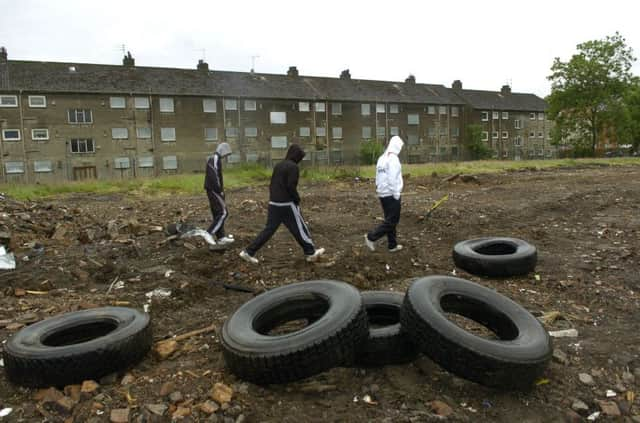Welfare reforms: Glasgow wards on poverty list


Holyrood’s welfare reform committee said it had statistical “proof” that the benefit changes had impacted more on the poorest areas, which it claimed lost nearly five times more money than those in more affluent areas.
The hardest-hit area was Glasgow Calton, which lost an average of £880 per year for each adult of working age, compared with £180 in more affluent St Andrews.
Advertisement
Hide AdAdvertisement
Hide AdMore than a dozen Glasgow wards figure prominently in the study among a list of the worst poverty blackspots in Scotland.
The UK government has introduced changes to welfare such as a imposing a cap on housing benefit, a three-year freeze on child benefit, as well as scrapping disability living allowance and incapacity benefits in their existing form.
Holyrood’s welfare reform committee claimed the changes would take £1.6 billion a year out of the Scottish economy – the equivalent of £460 a year for every adult of working age.
Glasgow had Scotland’s biggest financial loss from the reforms at £259 million a year – or £620 for every adult of working age – the study said.
The SNP and Labour-dominated committee said that the “financial loss is large” to Scotland, but was on a similar scale to the UK as a whole.
Scotland’s average loss of £460 a year per adult of working age is close to the British average of £470, the research showed.
Glasgow ranks 23rd out of 379 districts across the UK in terms of the financial loss per working age adult, below Liverpool in eighth place, but above Birmingham in 43rd and Manchester at 45th.
MSPs said the research “demonstrates a clear relationship between the extent of deprivation and the scale of financial loss”.
Advertisement
Hide AdAdvertisement
Hide AdProfessor Christina Beatty and Professor Steve Fothergill, from the Centre for Regional Economic and Social Research at Sheffield Hallam University, conducted the research.
Prof Fothergill suggested that the reforms had affected poverty-ravaged communities and there had been a knock-on effect on individuals. .
Committee convener Michael McMahon, a Labour politician, said MSPs would challenge coalition ministers over the impact of welfare reform.
He said: “Evidence that we have received indicated that our poorest communities are being hit hardest by welfare reform but we had no statistics to back this up. Now we have before us the evidence that proves it, right down to the electoral ward.
“The UK government cannot continue to refuse to engage on welfare reform. Not only do they refuse to undertake research like ours to assess the impact on people, but the relevant DWP [Department for Work and Pensions] minister continuously refuses to talk to us on the record and in public.”
A DWP spokesman said: “The truth is, employment is up, unemployment is falling and our vital reforms are working. We are returning fairness to the welfare system and helping people lift themselves out of poverty by making work pay.
“We are transforming the lives of the poorest people in society and bringing sense back to the welfare system.”
SEE ALSO: